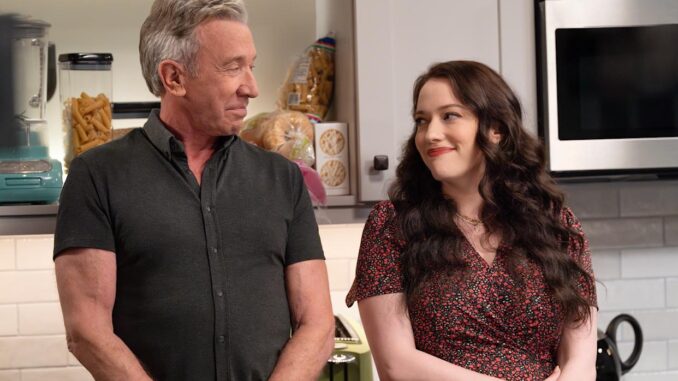
Shifting Gears: The Appeal of Familiar Faces and the Multi-Cam Promise
The announcement that Jenna Elfman would join Tim Allen and Kat Dennings in the upcoming multi-camera comedy "Shifting Gears" sent a ripple of nostalgic excitement through the television landscape. It was a reunion of comedic talents, a blend of familiar faces promising a return to the comforting rhythms and predictable laughter of the classic sitcom. The news highlighted not just the star power involved, but also the enduring appeal of the multi-camera format, a genre often considered old-fashioned but still capable of capturing a broad audience yearning for uncomplicated entertainment.
Jenna Elfman, best known for her energetic portrayal of Dharma in the eponymous "Dharma & Greg," brings a unique brand of quirky optimism to the table. Her physical comedy and infectious enthusiasm are tailor-made for the multi-camera style, where exaggerated expressions and perfectly timed reactions are amplified by the presence of a live audience. Elfman embodies a certain wholesome irreverence, a knack for finding humor in everyday chaos that resonates with viewers seeking lighthearted escape. This persona, combined with her proven track record in successful sitcoms, makes her a natural fit for "Shifting Gears" and a valuable asset in its pursuit of comedic gold.
Tim Allen, a veteran of the genre with the long-running "Home Improvement" under his belt, represents a cornerstone of the multi-camera comedy world. He established himself as the quintessential dad, a lovable goofball navigating the complexities of family life with a mixture of frustration and affection. His comedic timing is impeccable, honed over years of performing in front of live studio audiences. Casting him in "Shifting Gears" is a clear attempt to recapture that same magic, to tap into the nostalgia for simpler times and family-centric humor that made "Home Improvement" such a cultural phenomenon. Allen’s presence guarantees a certain level of comfort and familiarity, reassuring viewers that they know what to expect: witty banter, relatable family dynamics, and a reassuringly predictable resolution at the end of each episode.
Kat Dennings, though perhaps less associated with the traditional multi-camera setup, offers a crucial counterpoint to Elfman and Allen's established personas. Known for her deadpan delivery and sardonic wit in shows like "2 Broke Girls," she brings a modern sensibility to the mix. Dennings’s presence signals that "Shifting Gears" aims to blend the classic elements of the multi-camera format with a contemporary edge. Her dry humor and cynical outlook could provide a necessary dose of realism and prevent the show from becoming overly sentimental or relying too heavily on tired tropes. She represents a younger generation of viewers, potentially broadening the show's appeal beyond the established fanbase of Allen and Elfman.
The decision to return to the multi-camera format is itself significant. In a television landscape dominated by single-camera comedies with intricate storylines and complex characters, the multi-camera sitcom offers a different kind of experience. It's a comfort food genre, providing predictable laughs and easy-to-follow narratives. The reliance on a live audience fosters a unique energy, creating a sense of immediacy and shared experience that is absent in single-camera shows. While some may dismiss it as outdated, the enduring popularity of multi-camera sitcoms like "The Big Bang Theory" and "Modern Family" proves that there is still a strong demand for this type of entertainment.
Ultimately, the success of "Shifting Gears" will depend on its ability to strike a balance between nostalgia and innovation. The presence of Elfman, Allen, and Dennings offers a compelling combination of established talent and modern sensibilities. By embracing the strengths of the multi-camera format – its reliance on strong character dynamics, witty dialogue, and perfectly timed comedic beats – while injecting it with fresh perspectives and contemporary themes, "Shifting Gears" has the potential to be more than just a nostalgic throwback. It could be a reminder of the enduring power of laughter and the comforting familiarity of the classic sitcom, all while offering a glimpse of its potential to evolve and remain relevant in a rapidly changing television landscape. The gears are shifting, and it remains to be seen whether this comedic vehicle can navigate the road to success.